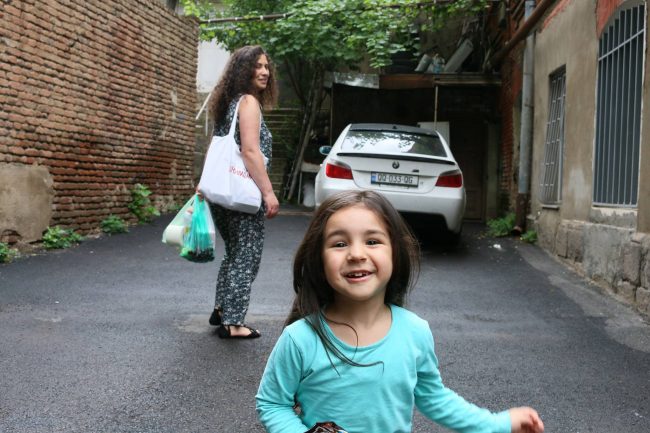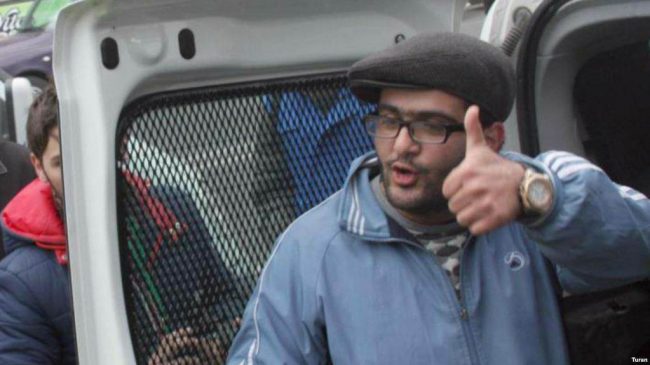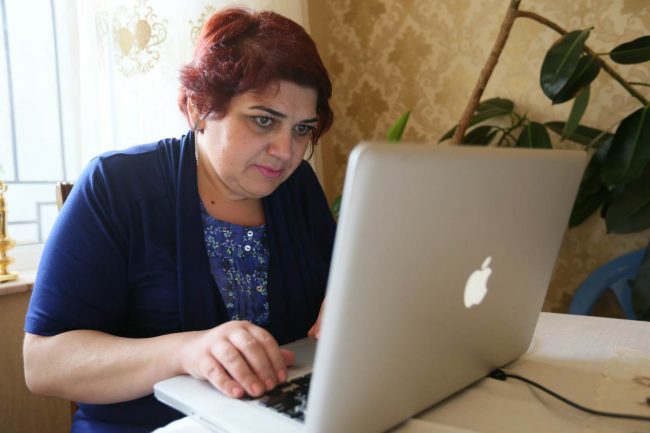

 The number of political prisoners in Azerbaijan is among the highest in Europe. This repression serves not only as a tactic of intimidating journalists, activists, and the opposition, but also an instrument of foreign policy.
The number of political prisoners in Azerbaijan is among the highest in Europe. This repression serves not only as a tactic of intimidating journalists, activists, and the opposition, but also an instrument of foreign policy.
Investigative journalist Leyla Mustafayeva is married to political prisoner Afgan Mukhtarli. Their three-year-old daughter Nuray is unaware of her father’s imprisonment; she believes what her mother told her, that her father is simply a long way away. She and her mother have moved to Germany.
Back in May, Nuray’s father disappeared in Tbilisi, Georgia, where he had lived since 2015. He turned up the next day — already in an Azerbaijani prison in Baku. The European Parliament stated that he was kidnapped and handed over to the Azerbaijani government, and that his imprisonment was politically motivated.
A political prisoner quota
Why are Azerbaijani journalists, human rights activists, and politicians being persecuted even beyond the country’s borders? Is the government afraid of their activities or are their arrests serving other purposes?
Leyla says the government uses the arrests of political prisoners mainly in its negotiations with Western countries.
‘When a political prisoner goes free, the first question I have is who will be arrested to replace them? The number of political prisoners has became a quota in Azerbaijan’, she says.
Mustafayeva says the reason her husband was targeted was mainly his reporting on corruption in the ruling Aliyev family.
‘Afgan Mukhtarli was kidnapped and taken to [Azerbaijan] by the special services of Georgia and Azerbaijan. He was arrested 100 metres from our house in Tbilisi. He is accused of illegally crossing the border, smuggling, and hitting a border-guard’, Leyla says.
The government’s miscalculations
There was another memorable arrest earlier this year. Mehman Aliyev, head of the Turan Information Agency (which has been described as ‘the country’s last independent media outlet’), was arrested on 24 August. He was moved to house arrest 17 days later. Aliyev was accused of tax evasion, abuse of power, and illegal entrepreneurship.
He told OC Media the US was involved in arranging his release, adding that sometimes political persecutions turn out to be the wrong card to play for the Azerbaijani government.
‘Had I not been released, the US Senate had threatened to announce a list of sanctions for officials who had imprisoned me. The [Azerbaijani] government didn’t gain anything, but lost out. For example, on 19–20 September, [President Ilham] Aliyev was ready to meet with President Trump during his visit to the US, but the other side refused the meeting because of my arrest’, Mehman Aliyev told OC Media.
Intimidation tactics

There are currently over 100 political prisoners in Azerbaijan, according to Rasul Jafarov, a member of the independent Working Group on the Preparation of a Single List of Political Prisoners.
One of the people on the list is Ilkin Rustamzade, a member of the NIDA Civic Movement. His mother Atlas Huseynova told OC Media the government is afraid of anyone who gathers idealistic young people to protest.
Rustamzada is accused of organising mass protests in Baku in 2013, for which he was imprisoned for 8 years. He has already been in jail for four years.
His mother says his arrest was intended to silence him and scare anyone else wishing to protest.
Bargaining chips
Azerbaijani investigative journalist Khadija Ismayil told OC Media there are two reasons behind these arrests: silencing people who are active in the political scene and using them as bargaining chips when needed.
‘For example, I was arrested because I shed light on corruption in which the ruling family is involved’, she said.
Ismayil notes that at the same time, in negotiations with Western diplomats, the liberty of imprisoned political prisoners is used by the authorities to gain something in return.
‘For example when I was in custody, this was repeatedly attempted. In my meetings with the international organisations that came to prison, my first words were, “if you make any agreement with them, I don’t need that freedom” ’, Ismayil said.
In a letter sent from prison in 2015, she wrote that she was not a toy to be swapped in negotiations between Baku and Washington.
She was sentenced to seven years and six months in prison accused of embezzlement and tax evasion. Ismayil was finally released in 2016.

‘No political prisoners’
Member of the opposition Musavat party, Elman Fattah, told OC Media that since 1993, the issue of political prisoners has served the interests of those in power.
‘The Azerbaijani authorities avoid discussion of important political reforms, which will pose risks in the future during negotiations with international organisations’, he said.
In contrast, Deputy Executive Secretary of the ruling New Azerbaijan Party, Siyavush Novruzov last year told the media that there are no political prisoners in Azerbaijan.
‘There are people who commit crimes in our country. Regardless of their professional activities or party affiliation, every human being has to be responsible for what they do. All these people are equal before the law, and if they commit a crime, they will serve their sentence as proscribed by the law’, he said.
‘Little logic’
Political scientist Rauf Mirgadirov told OC Media fear is not the reason the government arrests activists. The government simply wants to display its iron fist. According to Mirgadirov, the list of 160 political prisoners has shifted the subject of dialogue between the government and western institutions from the economy to political persecutions.
‘When we look at previous years, 1999 or 2000, discussions with western institutions were about economic or education reforms. Current conversations mainly focus on someone’s freedom and negotiations have turned into political bargaining’, Mirgadirov said.
Tamara Grigoriyeva is Freedom House’s project coordinator for Azerbaijan. She says that some of the government’s measures towards activists are most likely aimed at intimidating the rest of society.
‘Of course, it’s also true that the Azerbaijani government has turned the whole arrest–release of political prisoners into a revolving door that it uses in negotiations with Western governments and multilateral institutions’, she told OC Media.
She says that Western parties should not fall for this tactic. ‘We are talking about real people, real families, real lives’, she adds.
Grigoriyeva also points out that it is often hard to know the motives behind the actions of Azerbaijan’s leaders, who are just ‘several impulsive people with little logic behind their actions’.
In all this, Afgan Mukhtarli’s daughter Nuray still believes her father is far away. She asks her mother hundreds of questions about him.






